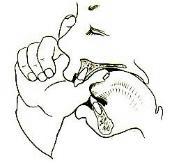|
|
|
Sucking
is one of a baby's natural reflexes.
It is a normal infant reflex which makes a child feel secure
and happy. It is normal and healthy for babies to suck their
tiny thumbs – even before they are born!!! It is visible on
a prenatal 3-D ultrasound of mother.
Thumb sucking does not cause permanent problems with the
teeth or jaw line unless it is continued beyond 4 to 5 years
of age. About 85% - 99% of children stop thumb
sucking spontaneously before this period.
However, when thumb sucking is continued beyond this, it may
cause problems. The child may develop protruded
teeth. This is because of the pressure applied by the thumb
on the teeth. The severity of the problem depends on
frequency, intensity, duration and also the position in
which the thumb is placed in the mouth. Speech defects can
occur from malaligned teeth resulting from thumb sucking
and/or finger-sucking.
The most common time for sucking is when children are tired,
bored, or in need of comfort. Therefore timing of treatment
is important. Another important aspect is that your child
should be willing to give up thumb sucking. If your child is
not willing to stop, therapy is not usually indicated.
Pressure applied to stop may only lead to resistance and
lack of cooperation. It can turn a natural developmental
phase into an ingrained habit. So try again later.
You should try to create an environment where the child
chooses to stop on its own. You can weaken the thumb-sucking
habit by distracting the child when you notice the thumb in
her mouth. Engage the child in such a way that he/she uses
both hands. Your child needs attention and understanding .So
gently discourage the habit. Reminders such as a band-aid on
the thumb can help. Praise your child when successful. Take
one step at a time. Encourage your child not to suck during
one daytime activity, like story time or television
watching. Gradually add another activity until daytime
sucking is controlled.
After Daytime Sucking is controlled, Help your child
to give up the sucking habit during sleep. This is usually
an involuntary process and a glove, sock, or thumb/finger
guard can help stop the habit. If these considerations are
not successful, see your dentist for further support.
.jpg)
 |
|